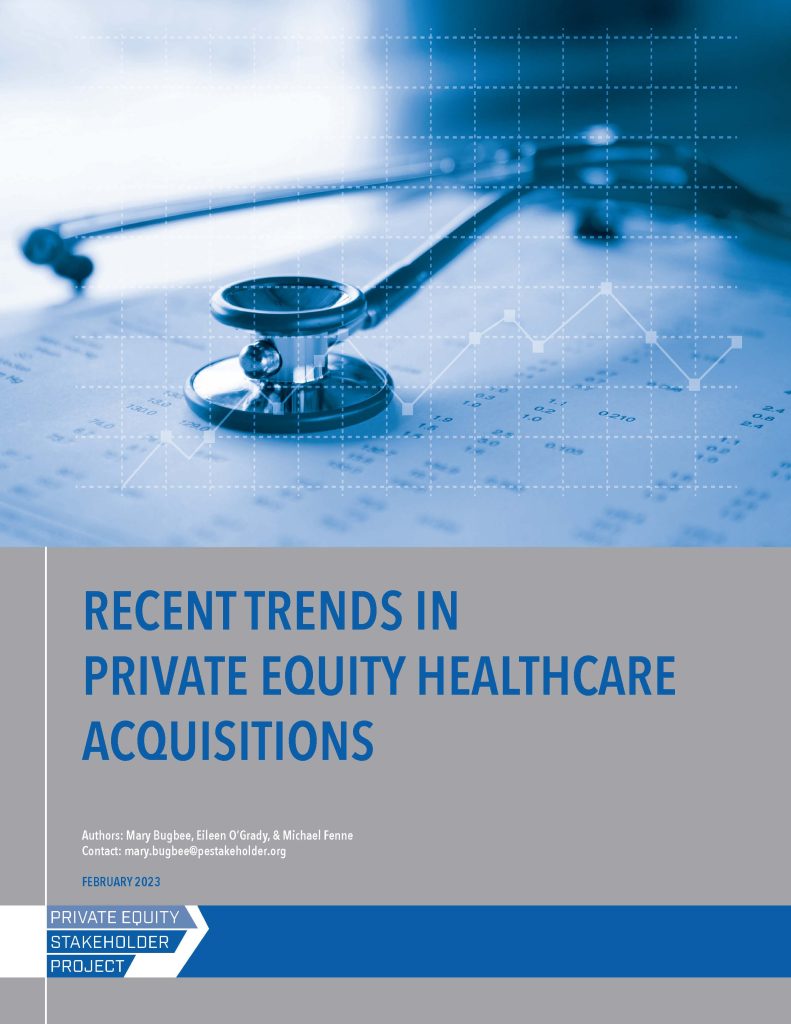
New report analyzes a frenzy of private equity activity in healthcare companies
February 23, 2023
Private equity healthcare investments in 2022 were the second highest on record
A new report released by the Private Equity Stakeholder Project provides an analysis of private equity (PE) deal activity in the US healthcare sector during 2022. The report, “Recent Trends in Private Equity Healthcare Acquisitions,” spotlights the areas in the healthcare industry that have seen the highest volume of PE activity, as well as the monthly trends in the sector. Included, past PESP research has augmented these findings to provide an integrated and comprehensive view of all PE activity, revealing that private equity healthcare investments in 2022 were the second highest on record after 2021.
“Private equity firms are drawn to investing in fragmented markets that experience high demand,” said Mary Bugbee, report co-author and PESP healthcare researcher. “They look to invest capital to consolidate small time players into powerhouse companies with bigger shares of the market. Right now, healthcare remains an optimal space for private equity investment because there is permanent demand for healthcare services and many subsectors within the healthcare industry are fragmented and ripe for consolidation.”
PESP counted 125 buyouts and 503 add-on acquisitions to 364 unique platform companies in 2022. These deals involved 471 private equity firms and similar types of private investors. Private equity-backed healthcare acquisitions remained steady throughout 2022, with the most deal activity in January, June, and September. The outpatient care subsector saw the most deal activity, with especially high deal volumes in dental care and eye care. Additionally, the specialties of orthopedics and podiatry are increasingly becoming desirable investment targets. Medtech, health IT, healthcare administration, contract research organizations (CROs), behavioral health, and home health and hospice made it to the top 15 categories where deal activity occurred.
“Private equity firms’ growing presence in healthcare and their penchant for consolidation should be a concern for the entire healthcare industry,” Bugbee said. “Private equity typically buys up companies with the aim to produce outsized returns over short time periods. However, as we’ve historically seen in healthcare, this strategy can lead to cost-cutting efforts that jeopardize patient care and working conditions. The strategy to consolidate companies into larger ones can also lead to higher prices and overall higher costs for patients and payers.
“Even more concerning are private equity firms’ tendency to use high levels of debt to fund their investments, which can lead to unmanageable debt obligations that may divert money away from patient care and fair compensation for employees.”
In light of investor interest in healthcare and the many risks associated with private equity ownership of these companies, the PESP report identifies actionable policy recommendations for the federal government. PESP advocates for an expansion of federal pre-merger review to include all healthcare private equity-backed merger and acquisition transactions, regardless of dollar value. Any private equity-backed healthcare acquisition would require reporting to and review by the DOJ and FTC under an amended Hart-Scott-Rodino Act. Additionally, PESP recommends that the U.S. Department of Health and Human Services should have review authority over healthcare mergers and acquisitions due to impacts private equity investment may have on the quality of and access to patient care.

